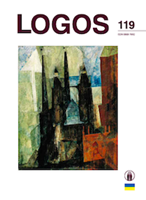Humanizmo samprata Vydūno tragedijoje "Pasaulio gaisras"
The Concept of Humanism in Vydūnas' Tragedy Pasaulio gaisras
Author(s): Roma BončkutëSubject(s): Lithuanian Literature, Sociology of Culture, Theory of Literature, Sociology of Literature
Published by: Visuomeninė organizacija »LOGOS«
Keywords: humanity; culture; war; peace; law; liberty;
Summary/Abstract: The article aims to show that the close connection between culture and humanism, vividly reflected by Vydūnas in his tragedy Pasaulio gaisras („The Fire of the World“) (1922-1928), is a continuation of the tradition of German cultural humanism and not Vedantism. The article begins with a brief discussion of the development of Western humanism, touching on the themes of hospitality, Christian humanism and holiness. The tragedy is remarkable for its parallels with Johann Gottfried Herder's concept of humanism, especially his letters in defense of humanism, Briefe zur Beförderung der Humanität (1797). The analysis of the tragedy allows us to say that in the tragedy "Pasaulio gaisras" Vydūnas, similarly to Herder, questions the problem of culture and humanism in the context of war, giving the woman the most important role of educator of humanism and peacemaker. The themes of hospitality, Christian love and cultural missionaryism reflect not only the Western origins of Vydūnas' humanism, but also its critique. Vydūnas shows that highly cultured German officers who graduated from the military academy lacked common sense and empathy. Vydūnas, like Herder, criticises educated but unspiritual people who are detached from practical, everyday "human affairs" and who can only judge a given situation according to the rigid letter of the law and not based on objective, complex reality. Vydūnas shows that a person's detachment from reality inevitably threatens to lead back to barbarism. Vydūnas entrusts the education of future generations to women who, being more closely connected to the domestic environment, are grounded in reality, have preserved their own individuality and are therefore able to appreciate the individuality of others. Vydūnas' humanism is the ability of an individual to learn about the environment and oneself, to develop in cooperation with others, and to be guided by good examples of national and global culture. Only a person who realises oneself and cultivates one's spirit rises to universal human values: wisdom, freedom, justice, virtue. The death of Magė, the protagonist of the tragedy, in her native house, set on fire by the enemy Germans, is like the sacrifice of the first Christian martyrs for the renewal of society.
Journal: LOGOS - A Journal of Religion, Philosophy, Comparative Cultural Studies and Art
- Issue Year: 2024
- Issue No: 119
- Page Range: 39-48
- Page Count: 10
- Language: Lithuanian

